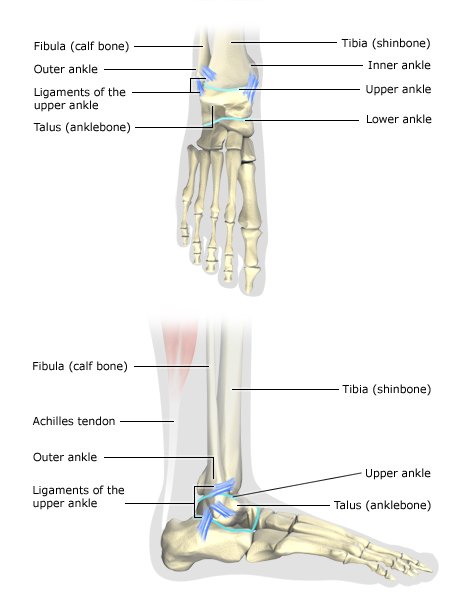What are ligaments, and what do they do?
Ligaments are made out of connective tissue that has a lot of strong collagen fibers in it. They are found in different shapes and sizes in the body. Some look like pieces of string, others look like narrow or wide bands. There are arch-shaped ligaments, too.
Ligaments often connect two bones together, particularly in the joints: Like strong, firmly attached straps or ropes, they stabilize the joint or hold the ends of two bones together. This ensures that the bones in the joint don’t twist too much or move too far apart and become dislocated.
But there are also some ligaments that aren’t connected to bones. For instance, some make sure that internal organs are kept in place. A typical example is the womb, which is kept in the right position in the pelvis by ligaments. Ligaments may also connect two or more organs to each other. For instance, the liver, intestine and stomach are held in place by ligaments in the abdominal cavity. These ligaments often have sensitive structures like blood vessels or gland ducts running through them. The strong connective tissue in the ligaments protects these structures and prevents them from bending, twisting or tearing.
Regardless of whether they connect bones or organs to each other, ligaments help to maintain stability in the body. Their function is reflected in their name, which comes from “ligare” – the Latin word for “bind” or “tie.”
Lippert H. Lehrbuch Anatomie. München: Urban und Fischer; 2003.
Niethard FU, Pfeil J, Biberthaler P. Duale Reihe Orthopädie und Unfallchirurgie. Stuttgart: Thieme; 2014.
Pschyrembel. Klinisches Wörterbuch. Berlin: De Gruyter; 2017.
IQWiG health information is written with the aim of helping people understand the advantages and disadvantages of the main treatment options and health care services.
Because IQWiG is a German institute, some of the information provided here is specific to the German health care system. The suitability of any of the described options in an individual case can be determined by talking to a doctor. informedhealth.org can provide support for talks with doctors and other medical professionals, but cannot replace them. We do not offer individual consultations.
Our information is based on the results of good-quality studies. It is written by a team of health care professionals, scientists and editors, and reviewed by external experts. You can find a detailed description of how our health information is produced and updated in our methods.
How we keep you informed
Follow us on Twitter or subscribe to our newsletter or newsfeed. You can find all of our films online on YouTube.


